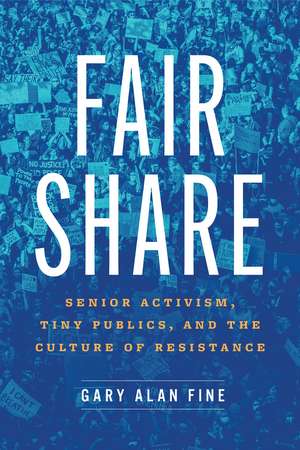Fair Share: Senior Activism, Tiny Publics, and the Culture of Resistance
Autor Gary Alan Fineen Limba Engleză Paperback – 22 ian 2023
If you've ever been to a protest or been involved in a movement for social change, you have likely experienced a local culture, one with slogans, jargon, and shared commitments. Though one might think of a cohort of youthful organizers when imagining protest culture, this powerful ethnography from esteemed sociologist Gary Alan Fine explores the world of senior citizens on the front lines of progressive protests. While seniors are a notoriously important—and historically conservative—political cohort, the group Fine calls “Chicago Seniors Together” is a decidedly leftist organization, inspired by the model of Saul Alinsky. The group advocates for social issues, such as affordable housing and healthcare, that affect all sectors of society but take on a particular urgency in the lives of seniors. Seniors connect and mobilize around their distinct experiences but do so in service of concerns that extend beyond themselves. Not only do these seniors experience social issues as seniors—but they use their age as a dramatic visual in advocating for political change.
In Fair Share, Fine brings readers into the vital world of an overlooked political group, describing how a “tiny public” mobilizes its demands for broad social change. In investigating this process, he shows that senior citizen activists are particularly savvy about using age to their advantage in social movements. After all, what could be more attention-grabbing than a group of passionate older people determinedly shuffling through snowy streets with canes, in wheelchairs, and holding walkers to demand healthcare equity, risking their own health in the process?
| Toate formatele și edițiile | Preț | Express |
|---|---|---|
| Paperback (1) | 243.39 lei 6-8 săpt. | |
| University of Chicago Press – 22 ian 2023 | 243.39 lei 6-8 săpt. | |
| Hardback (1) | 584.00 lei 6-8 săpt. | |
| University of Chicago Press – 22 ian 2023 | 584.00 lei 6-8 săpt. |
Preț: 243.39 lei
Nou
46.58€ • 48.12$ • 38.77£
Carte tipărită la comandă
Livrare economică 25 martie-08 aprilie
Specificații
ISBN-10: 0226823830
Pagini: 256
Ilustrații: 4 halftones
Dimensiuni: 152 x 229 x 18 mm
Greutate: 0.37 kg
Ediția:First Edition
Editura: University of Chicago Press
Colecția University of Chicago Press
Notă biografică
Gary Alan Fine is the James E. Johnson Professor of Sociology at Northwestern University. He has written many books, including, most recently The Hinge: Civil Society, Group Cultures, and the Power of Local Commitments, also published by the University of Chicago Press.
Cuprins
Prologue: A Snowy Day in Racine
Introduction: Of Seniors, for Seniors
1 Causes, Commitment, and Culture
2 Coming of Age
3 Where the Actions Are
4 Movement Memories and Eventful Experience
5 Staff Power and Senior Authority
6 Diversities
7 The Nexus of Politics
8 Our Fair Share
Acknowledgments
Notes
Index
Recenzii
Descriere
A deeply researched ethnographic portrait of progressive senior activists in Chicago who demonstrate how a tiny public wields collective power to advocate for broad social change.
If you've ever been to a protest or been involved in a movement for social change, you have likely experienced a local culture, one with slogans, jargon, and shared commitments. Though one might think of a cohort of youthful organizers when imagining protest culture, this powerful ethnography from esteemed sociologist Gary Alan Fine explores the world of senior citizens on the front lines of progressive protests. While seniors are a notoriously important—and historically conservative—political cohort, the group Fine calls “Chicago Seniors Together” is a decidedly leftist organization, inspired by the model of Saul Alinsky. The group advocates for social issues, such as affordable housing and healthcare, that affect all sectors of society but take on a particular urgency in the lives of seniors. Seniors connect and mobilize around their distinct experiences but do so in service of concerns that extend beyond themselves. Not only do these seniors experience social issues as seniors—but they use their age as a dramatic visual in advocating for political change.
In Fair Share, Fine brings readers into the vital world of an overlooked political group, describing how a “tiny public” mobilizes its demands for broad social change. In investigating this process, he shows that senior citizen activists are particularly savvy about using age to their advantage in social movements. After all, what could be more attention-grabbing than a group of passionate older people determinedly shuffling through snowy streets with canes, in wheelchairs, and holding walkers to demand healthcare equity, risking their own health in the process?
